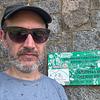You need to sign in or sign up before continuing.
Take a photo of a barcode or cover
emotional
hopeful
informative
inspiring
sad
tense
medium-paced
Who knows how much aid is siphoned off to buttress the army?Reading this now was akin to as if I dragged my nearly 30 year old body back to 5th grade and subjected myself to a science class that incorporated creationism in its teachings. Outside Kang's testimony, the facts mentioned are often heavily simplified and/or twisted and/or truncated that they're borderline useless for if one wants to do more than simply be engrossed and/or enraged by a testimonial narrative of oppression and resistance. If these are Kang Chol-Hwan's own words, it's rather ridiculous for someone to shell out $40 for what, by the end, devolved into copy paste reactionary propaganda (not to mention the grammar errors). If this Pierre Rigoulot (the interlocutor, a Korean woman who managed interpretations between the two credited authors, goes unnamed) had more than a hand in Kang's more tangential/dismissive outbursts, it'll be even more ridiculous to pay around the equivalent of a full tank of gas for a rant that had the potential to be more than a decent recountal. All in all, one of the more inflammatory texts that have survived the various purges of my shelves. I definitely learned quite a lot, but I'm sure this work has been used to silence the legitimate concerns of Korean and other "leftists" that the work touches on so dismissively. Having read [b:Human Acts|30091914|Human Acts|Han Kang|https://i.gr-assets.com/images/S/compressed.photo.goodreads.com/books/1462662940l/30091914._SX50_.jpg|48190343], [b:The Guest|1447640|The Guest|Hwang Sok-yong|https://i.gr-assets.com/images/S/compressed.photo.goodreads.com/books/1320517182l/1447640._SY75_.jpg|1438348], and various other works ground in the history of Korea, South as well as North, I find it rather difficult, if not impossible, to not think otherwise.
I had my doubts going into this work simply because of how much I have learned about the bigger picture of certain highly maligned, leastwise in contemporary times, sections of the world, most recently thanks to Mishra's [b:From the Ruins of Empire|13536357|From the Ruins of Empire The Revolt Against the West and the Remaking of Asia|Pankaj Mishra|https://i.gr-assets.com/images/S/compressed.photo.goodreads.com/books/1347585243l/13536357._SY75_.jpg|19098070]. Simply put, white people in the US who read this usually have a very specific goal in mind, as what history is used in context only gets away with being presented as such by this being a memoir by a verified former North Korean survivor of the work/reeducation camps. I don't doubt Kang's testimony regarding his time in North Korea, but considering how his doing well in South Korea was not actually ensured at all by any form of capitalism, it's rather ridiculous how much he moves away from his direct observations in order to glorify the more ostentatious aspects of a system of government where everything is for sale. This continues to the point that I shudder to think of what kind of impact reading this would have had on me way back when I first added it, as what use I got out of it probably shows up in other works in far less sensationalized terms that doesn't give the idea that the US blesses anything it invades and brainwashes and destroys. The British in India and China was the bogeyman that drew Japan into Korea and subsequently created the terror that drove the Koreans to any promise of humanity, and back then, the pretensions of capitalism weren't quite so solidified by the failures of various communistic governments in the wake of US interference.
I really wouldn't recommend this work to anyone with any degree of knowledge of North Korea. An introduction to the subject through a work like this will require a great deal of critical post-destabilization later on if a reader wants to have any semblance of global/historical context, while a continuation of building knowledge would result in the sort of exasperation you can observe on my part. I suppose this work would be beneficial in the hands of someone who's interesting in researching the issue more in depth with the benefit of a multitude of other works. Otherwise, the average white denizen of the US is just going to lap this up as evidence that they are indeed the best and vote into power the whole miserable cycle of imperial rack and ruin all over again. Not the prettiest picture, but then again, no one comes to this sort of work expecting such, so for my review to have this tone is rather fitting, ironically. I just hope people realize that the horrors of North Korea are never going to be solved by ignoring the horrors of its white saviors, cause I'm sure, once North Korea's torn down, France or Britain or the US or whomever will be watching and waiting to gauge how the winds are blowing and when it's safe to move right back in.
Here is the dilemma one always faces when trying to help a population that has fallen victim to famine-causing political and economic systems: aiding the population also means maintaining the regime.
As the title suggests, this is the author's autobiography following his internment in and escape from North Korea. Certainly well-written, and his mission is admirable, but it wasn't quite a book I couldn't put down, even though it gets a 3.5 for cultural importance.
Стилът е ужасен и историята също е ужасна, но е от задължителните четива. За да познаваш доброто, трябва да познаваш и злото, а тази книга дава голямо знание в тази посока.
This is a great memoir and I loved Kang’s voice throughout. Despite terrifying circumstances, Kang remains hopeful, poetic and even funny in the retelling of his tribulations in North Korea. One interesting part about the book, which some might not like, is that Kang mostly tells the story through specifics anecdotes with sweeping explanations in between. I found this captivating, but it also makes Kang seem somehow distant from the reader at times.
A haunting depiction of life in North Korea. While the treatment faced by Kang Chol-Hwan and his family in Yodok is horrific, the writing didn't fully grab me and I didn't feel fully invested in the story. Another reviewer cited the "emotional distance" between the author and his story, and I couldn't have said it better myself. Perhaps due to the co-authorship with Pierre Rigoulot in French, then its further translation into English, either something was lost in translation, or the emotional distance was just too much to make a successfully moving account.
adventurous
dark
hopeful
informative
inspiring
reflective
sad
tense
medium-paced
Fuck, mad MAD respect to all the teachers who've taught/teaching their own country's suffering, it is heart-breaking. teaching is already damn personal, but teaching your own history to your students is a whole other level
Easily the most well written and gripping book on North Korea that I have read so far.
I thought this was a well written account of one man’s horrific experiences in a concentration camp. It is incredibly distressing to read, but also important to understand. Although this book was published a couple decades ago, it still has relevance today and is mirrored in basically any dictatorial regime.





